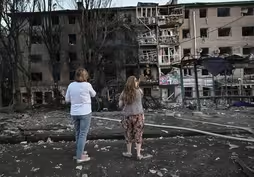
UN on plight of Afghan women 4 years after U.S. withdrawal
Clip: 8/30/2025 | 6m 15sVideo has Closed Captions
Afghan women’s freedoms severely restricted four years after U.S. withdrawal, UN says
Four years ago today, the U.S. military completed its chaotic withdrawal from Afghanistan. Since then, the Taliban has imposed Islamic law and severely restricted the rights of girls and women. John Yang speaks with Richard Bennett, the United Nations’ special rapporteur on the situation of human rights in Afghanistan, to learn more.
Problems playing video? | Closed Captioning Feedback
Problems playing video? | Closed Captioning Feedback
Major corporate funding for the PBS News Hour is provided by BDO, BNSF, Consumer Cellular, American Cruise Lines, and Raymond James. Funding for the PBS NewsHour Weekend is provided by...

UN on plight of Afghan women 4 years after U.S. withdrawal
Clip: 8/30/2025 | 6m 15sVideo has Closed Captions
Four years ago today, the U.S. military completed its chaotic withdrawal from Afghanistan. Since then, the Taliban has imposed Islamic law and severely restricted the rights of girls and women. John Yang speaks with Richard Bennett, the United Nations’ special rapporteur on the situation of human rights in Afghanistan, to learn more.
Problems playing video? | Closed Captioning Feedback
How to Watch PBS News Hour
PBS News Hour is available to stream on pbs.org and the free PBS App, available on iPhone, Apple TV, Android TV, Android smartphones, Amazon Fire TV, Amazon Fire Tablet, Roku, Samsung Smart TV, and Vizio.
Providing Support for PBS.org
Learn Moreabout PBS online sponsorshipJOHN YANG: Good evening.
I'm John Yang.
It was four years ago today that the United States completed its chaotic withdrawal from Afghanistan, bringing an end to America's longest war.
In the final days, Afghans, desperate to leave, rushed to the airport, crowding the tarmac and clinging to taxiing planes.
Some died when they fell from aircraft that were taking off.
Then, on August 30, 2021, a service member stepped onto a military plane, the last American to leave Afghanistan.
Two decades after the first troops had arrived, the military left many behind, Afghans who had worked with Americans and feared retribution from the Taliban.
Since then, the Taliban has imposed Islamic law and severely restricted the rights of girls and women.
To date, only Russia has recognized the Taliban as the legitimate government of Afghanistan.
Since 2022, Richard Bennett has been the U.N. Special Rapporteur on the situation of human rights in Afghanistan.
Mr. Bennett, in your most recent report to the U.N. Human Rights Commission, you focused on the plight of women and girls in Afghanistan.
Is that where the most dramatic effects are seen of the Taliban takeover?
RICHARD BENNETT, U.N. Special Rapporteur, Afghanistan: I believe that is the most dramatic situation.
Women and girls have been pretty much erased from any kind of public life.
It's well known that education is not available after sixth grade, that is after puberty.
But they're also barred from most types of employment.
They cannot move around cities alone.
They need a male chaperone.
Even their voices have been barred.
It is extraordinary.
I have called this gender persecution.
I've joined by the International Criminal Court, which has now issued arrest warrants for the two top Taliban leaders for the crime against humanity of gender persecution.
JOHN YANG: You said their voices have been barred.
Explain that.
RICHARD BENNETT: They are not allowed to speak in public.
They are not allowed to speak to a man.
There is a requirement that they remain silent.
JOHN YANG: Are there other groups in Afghanistan who are facing similar restrictions, similar persecution?
RICHARD BENNETT: Yeah.
There was a law passed about a year ago called the Promotion of Virtue and Prevention of Vice law, and it cracks down on many normal practices.
There are a crackdown on religious practices from minority religious groups, particularly Shia.
Men, too, are suffering.
There are requirements on men to grow long beards and to wear certain nonwestern clothes.
We've seen punishments increase in the last 12 months or so, and the punishments often involve flogging, public corporal punishment, also some public executions.
JOHN YANG: Your report also talks about women and girls who are forced to return, who had somehow made it to Pakistan and Iran and now being forced to return.
Tell me more about that.
RICHARD BENNETT: Yes, both those countries have hosted large populations of Afghans for many years, but both have been forcing Afghans to return.
And this year alone, around 2.1 million Afghans have returned to Afghanistan just from those two countries, many of them against their will.
And other countries have been indicating that they may do the same, including European countries.
And speaking to a U.S. audience, I understand that there may be 10 or 12,000 Afghans in the U.S. who are at risk of being sent back to Afghanistan.
And Afghanistan is not a safe, secure place for anyone, especially for women and girls, or for those Afghans who served in support of the international mission in Afghanistan that began more than 20 years ago.
JOHN YANG: What can the international community do about this?
Is there anything to do that would convince or persuade the Taliban to ease these restrictions?
RICHARD BENNETT: So far, engagement with them has not produced many results.
They are an autocratic regime.
They have an ideology, and their leadership, particularly in Kandahar, seems set on creating their version of an Islamic emirate ruled entirely by their version of Sharia law.
But I would make two points.
The first is a moral one.
Can the rest of the world stand by when Afghans, particularly women and girls, are treated worse than in any other country?
And the second is a political one.
It's in the interests of countries, including the U.S., including the security interests, not to allow such an extreme regime to continue.
There are claims, including by the U.N. Security Council, that they are a breeding ground for terrorists, maybe harboring other terrorist groups.
So the concerns that existed back in 2000, 2001 have returned.
Those Afghans who were desperate to leave four years ago, who clung onto planes because they feared what was coming, in many ways, they have been proven unfortunately correct.
JOHN YANG: Richard Bennett of the UN.
Thank you very much.
RICHARD BENNETT: You are welcome.
Thank you very much, Mr. Yang.
Amid growing obsession with protein, how much do we need?
Video has Closed Captions
Clip: 8/30/2025 | 7m 58s | Protein is everywhere amid a new cultural obsession. How much do we really need? (7m 58s)
How coyotes are adapting to urban life in U.S. cities
Video has Closed Captions
Clip: 8/30/2025 | 6m 24s | How coyotes are adapting to urban life and thriving in U.S. cities (6m 24s)
News Wrap: At least 1 killed in Russian strikes on Ukraine
Video has Closed Captions
Clip: 8/30/2025 | 3m 3s | News Wrap: At least 1 killed, dozens injured in Russian aerial assault on Ukraine (3m 3s)
Providing Support for PBS.org
Learn Moreabout PBS online sponsorship
- News and Public Affairs

FRONTLINE is investigative journalism that questions, explains and changes our world.

- News and Public Affairs

Amanpour and Company features conversations with leaders and decision makers.












Support for PBS provided by:
Major corporate funding for the PBS News Hour is provided by BDO, BNSF, Consumer Cellular, American Cruise Lines, and Raymond James. Funding for the PBS NewsHour Weekend is provided by...


